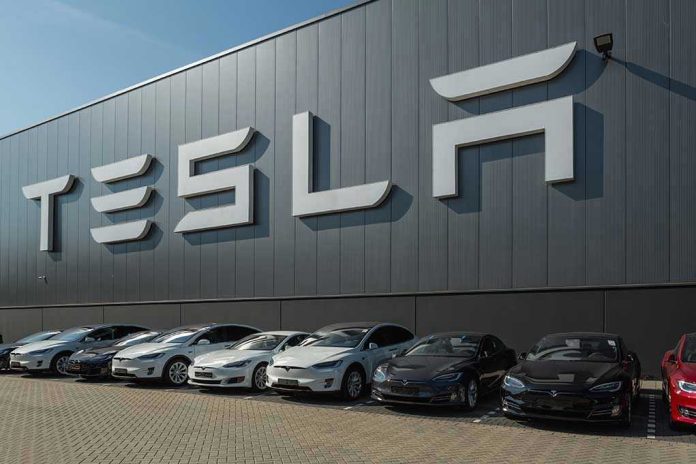
Thousands of Tesla vehicles face a sudden loss of drive power risk, raising urgent questions about EV safety and global supply chain accountability.
Story Snapshot
- Nearly 13,000 Tesla Model 3 and Model Y vehicles recalled for battery pack defect that increases crash risk.
- The defect stems from faulty battery pack contactors with InTiCa solenoids, tied to international suppliers.
- No injuries or fatalities reported; Tesla initiates proactive recall with oversight from U.S. regulators.
- Recall highlights broader concerns over rapid production, supplier quality, and regulatory scrutiny in the EV industry.
Battery Defect Triggers Major Recall for Tesla Drivers
Tesla has recalled 12,963 vehicles in the U.S.—specifically 2025 Model 3 and 2026 Model Y—after discovering a battery pack defect linked to faulty contactors supplied by InTiCa (Mexico) and SongChuan (Taiwan). This defect can cause a sudden loss of propulsion while driving, posing a serious crash risk. Tesla acted following 36 warranty claims and 26 field reports, but fortunately, no known injuries or fatalities have occurred. The recall underscores persistent challenges in ensuring safety amid complex, globalized supply chains.
The affected vehicles were produced between March and August 2025, with Tesla’s Field Reliability team launching an internal investigation in August after reports of unexpected power loss. By October, Tesla voluntarily recalled the vehicles and submitted its official report to the National Highway Traffic Safety Administration (NHTSA). Dealers were notified on October 15, and owners will begin receiving notifications by December 9. The defect impacts only about 1% of the recalled vehicles, but the risk of sudden drive power loss demanded decisive action from both Tesla and regulators.
Regulatory Oversight and Tesla’s Response
NHTSA, the federal agency responsible for vehicle safety, has played a central role in overseeing the recall and ensuring compliance with safety standards. Tesla will replace the faulty contactors free of charge and is coordinating with both U.S. and international suppliers to source certified replacement parts. This recall is part of a broader pattern, as Tesla and other automakers have faced increasing scrutiny over battery safety and hardware reliability in recent years. The proactive recall process and transparent reporting have been praised by some industry experts, although questions remain about early detection and supplier oversight.
Battery safety is a critical concern for electric vehicle manufacturers because sudden loss of propulsion can lead to dangerous road situations. Tesla’s rapid production cycles and reliance on a global network of suppliers heighten the challenge of maintaining consistent quality control. Previous Tesla recalls have addressed similar issues, from software bugs to hardware failures, reflecting ongoing risks in the push for innovation. As the EV market grows, such incidents prompt calls for stricter regulatory standards and more robust supplier audits to protect consumers and uphold safety.
Industry Implications and Consumer Impact
The recall has immediate consequences for Tesla owners, who must schedule repairs and endure potential inconvenience until the issue is resolved. Service centers are expected to see increased demand as replacement parts become available. Economically, Tesla faces costs associated with logistics, parts, and potential reputational damage, while investors monitor the company’s response and future risk mitigation strategies. The incident also sets a precedent for proactive recalls in the EV industry, likely influencing supplier standards and quality assurance practices across the sector.
Tesla recalls thousands of vehicles over battery defect that increases crash risk https://t.co/mdtdg2qDNw
— FOX Business (@FoxBusiness) October 22, 2025
Long-term, the recall highlights the importance of transparency and regulatory oversight as the automotive industry shifts toward electrification. It emphasizes the need for robust testing of high-voltage components and greater vigilance in global sourcing. For conservative readers, this event serves as a reminder of the risks inherent in rapid technological change, globalism, and reliance on foreign suppliers. Upholding safety and accountability is vital in defending American values and protecting consumers—especially as EVs become more common on our roads.
Sources:
Tesla recalls recent Model 3/Y over battery pack defect — Electrek
NHTSA Part 573 Safety Recall Report 25V690
Tesla recall loss of power solenoid fault news — TFLcar
Tesla Model 3, Model Y power loss recall — Car and Driver







